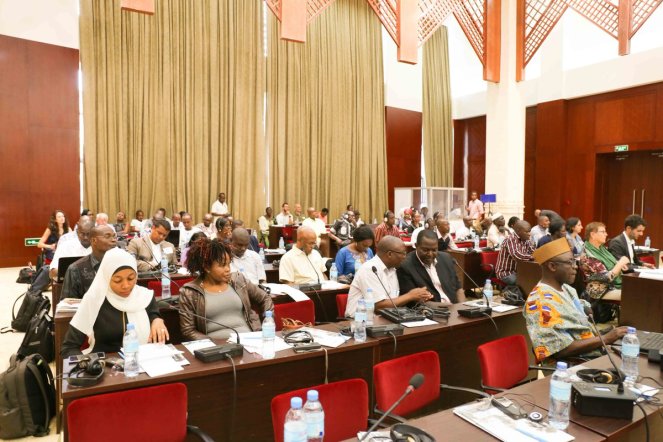In my ten years of campaigning and advocating for water, sanitation and hygiene (WASH), we have never had such a unique political opportunity for change as we have had this year at the start of Agenda 2030; the start of the new development goals for the next 15 years. In the past few months, my colleagues and I at the End Water Poverty secretariat have been criss-crossing Africa, Europe, South Asia and Latin America to tap into the enthusiasm of our members at the beginning of this ambitious path to achieve a universally better future for all. We have worked hard to unite in increasing the pressure on governments to ensure effective national implementation plans for our new sustainable development framework, particularly calling for the prioritisation and realisation of Goal 6: “ensure availability and sustainable management of water and sanitation for all”.
Our first stop was at the 6th Africa Water Week, organised by the Africa Ministers Council on Water (AMCOW), and held in July 2016 in Dar es Salaam, Tanzania. End Water Poverty co-hosted the civil society forum where we attracted over a hundred participants to reach common positions on the vision for Africa and action plans for all stakeholders to achieve the Sustainable Development Goals (SDGs).

The diverse range of participants engaged at the CSO Forum during the 6th Africa Water Week, Tanzania. Photo credit: James Kiyimba, WaterAid.
This important forum, bringing together a diverse range of civil society actors, culminated in the presentation of a civil society statement, clearly stating policy positions and actions as recommended by WASH civil society on how we will work together to achieve our future Agenda. This statement was read out by civil society representatives at the opening session of the ministerial conference; a powerful start to this high-level event which gathers African Water Ministers from around the region. We were delighted in the outcomes as the declaration influenced the final Ministerial Roadmap of the conference, particularly on the issues of equity, accountability, civil society participation, climate change resilience and the need for disaggregated data of service users.
Our intervention in this conference has sent a strong signal to African Water Ministers that civil society will be there in every step of the implementation of Goal 6, and will continue to ensure that governments keep their promises to these commitments. This regional roadmap is now the standard policy framework for the delivery of WASH and Goal 6 in Africa. The fantastic thing about this win is that, we as civil society, have managed to increase our influence on the difficult issues of equity and accountability which is a no-go area in countries where civil society has little room to campaign or advocate on such issues, without unduly exposing our members into harm’s way. What was clearly evident from our impact at this conference was that an organised and united civil society front has the power to influence national governments through regional and global forums.
At End Water Poverty, by working with our members and partners in the global WASH coalition, we are committed to holding governments accountable to their commitments; making sure that these are implemented and realised sustainably and effectively in order to truly leave no one behind. We would like to push the SDG agenda further by making sure that the human rights principles of participation, accountability, sustainability, equity and non-discrimination and freedom of information act as the framework and the yardstick for measuring the success of delivering water and sanitation to the most vulnerable and marginalised.
Since this successful intervention, we have prioritised capacity building for our members to strengthen and unite civil society to play its critical role as watchdog and co-implementer of our common agenda. We have continued this powerful momentum throughout the year in other regions; including in South-Asia where civil society have now developed their action plan for the next few years, all to ensure we truly leave no one behind. At the time of writing this blog, my colleagues are in Costa Rica on the tails of Hurricane Otto, organising a capacity building workshop for members in Latin America to develop road maps to realise our new agenda. It is critical that we work in partnerships, across stakeholder groups and across sectors to achieve the world we want.
To further this most important aim, End Water Poverty is undergoing a range of activities to ensure a strong, active and united civil society. We have launched a national context assessment which will map the current processes taking place at within countries to develop their implementation plans for the SDGs. We will also be using this to gather a deeper understanding of our members needs, in order to tailor our support according to the priorities of civil society around the world.
On 30 November 2016, we launched a new resource entitled “Making Rights Real”, a communications tool on the human rights to water and sanitation, at the conference of 7th Rural Water Supply Network Forum in Abidjan, Cote D’Ivoire. Communicating human rights could be challenging. These tools translate the technical terms around the human rights to water and sanitation into simple everyday language for service providers and planners, and show the benefits to service providers when they adopt human rights principles for planning and provision of services. It also has a “User Journey” guide which is useful for civil actors to help them identify potential ‘champions’ or ambassadors for human rights.
We are already over one year into our 15 year agenda; we don’t have time to waste. Civil society must continue to be a united, powerful agent for change.
2017 will start with a bang through the annual Water Action Month. Running throughout March, and culminating in the celebration of World Water Day on 22 March, this is a month long, global civil society campaign to call for a better future for all. The clock is ticking; let’s make every second count. Now is the time for action!
